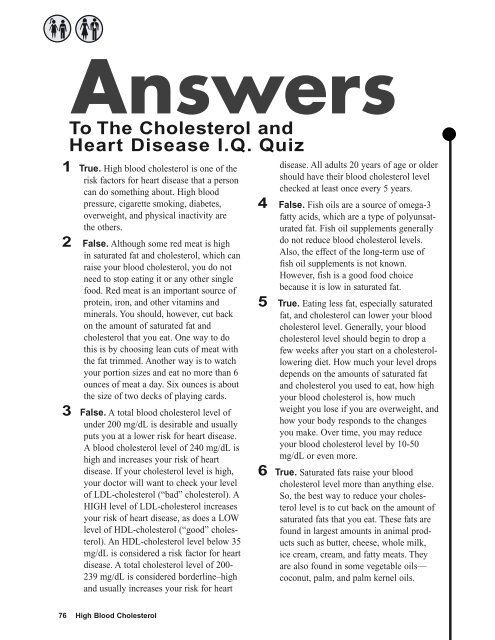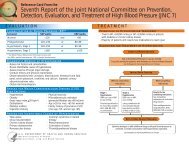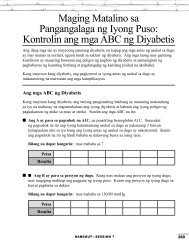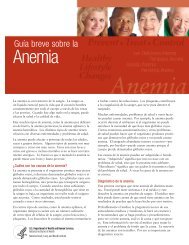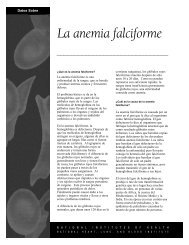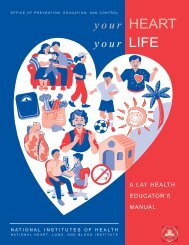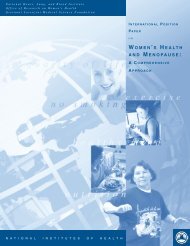HeartsNParks Community Mobilization Guide - National Heart, Lung ...
HeartsNParks Community Mobilization Guide - National Heart, Lung ...
HeartsNParks Community Mobilization Guide - National Heart, Lung ...
Create successful ePaper yourself
Turn your PDF publications into a flip-book with our unique Google optimized e-Paper software.
To The Cholesterol and<br />
<strong>Heart</strong> Disease I.Q. Quiz<br />
1 True. High blood cholesterol is one of the<br />
risk factors for heart disease that a person<br />
can do something about. High blood<br />
pressure, cigarette smoking, diabetes,<br />
overweight, and physical inactivity are<br />
the others.<br />
2 False. Although some red meat is high<br />
in saturated fat and cholesterol, which can<br />
raise your blood cholesterol, you do not<br />
need to stop eating it or any other single<br />
food. Red meat is an important source of<br />
protein, iron, and other vitamins and<br />
minerals. You should, however, cut back<br />
on the amount of saturated fat and<br />
cholesterol that you eat. One way to do<br />
this is by choosing lean cuts of meat with<br />
the fat trimmed. Another way is to watch<br />
your portion sizes and eat no more than 6<br />
ounces of meat a day. Six ounces is about<br />
the size of two decks of playing cards.<br />
3 False. A total blood cholesterol level of<br />
under 200 mg/dL is desirable and usually<br />
puts you at a lower risk for heart disease.<br />
A blood cholesterol level of 240 mg/dL is<br />
high and increases your risk of heart<br />
disease. If your cholesterol level is high,<br />
your doctor will want to check your level<br />
of LDL-cholesterol (“bad” cholesterol). A<br />
HIGH level of LDL-cholesterol increases<br />
your risk of heart disease, as does a LOW<br />
level of HDL-cholesterol (“good” cholesterol).<br />
An HDL-cholesterol level below 35<br />
mg/dL is considered a risk factor for heart<br />
disease. A total cholesterol level of 200-<br />
239 mg/dL is considered borderline–high<br />
and usually increases your risk for heart<br />
76 High Blood Cholesterol<br />
disease. All adults 20 years of age or older<br />
should have their blood cholesterol level<br />
checked at least once every 5 years.<br />
4 False. Fish oils are a source of omega-3<br />
fatty acids, which are a type of polyunsaturated<br />
fat. Fish oil supplements generally<br />
do not reduce blood cholesterol levels.<br />
Also, the effect of the long-term use of<br />
fish oil supplements is not known.<br />
However, fish is a good food choice<br />
because it is low in saturated fat.<br />
5 True. Eating less fat, especially saturated<br />
fat, and cholesterol can lower your blood<br />
cholesterol level. Generally, your blood<br />
cholesterol level should begin to drop a<br />
few weeks after you start on a cholesterollowering<br />
diet. How much your level drops<br />
depends on the amounts of saturated fat<br />
and cholesterol you used to eat, how high<br />
your blood cholesterol is, how much<br />
weight you lose if you are overweight, and<br />
how your body responds to the changes<br />
you make. Over time, you may reduce<br />
your blood cholesterol level by 10-50<br />
mg/dL or even more.<br />
6 True. Saturated fats raise your blood<br />
cholesterol level more than anything else.<br />
So, the best way to reduce your cholesterol<br />
level is to cut back on the amount of<br />
saturated fats that you eat. These fats are<br />
found in largest amounts in animal products<br />
such as butter, cheese, whole milk,<br />
ice cream, cream, and fatty meats. They<br />
are also found in some vegetable oils—<br />
coconut, palm, and palm kernel oils.


